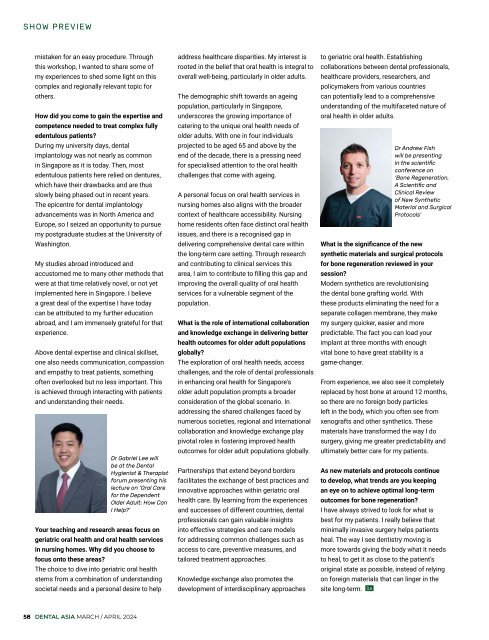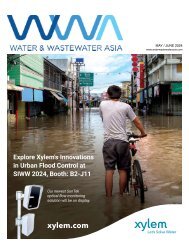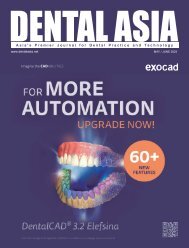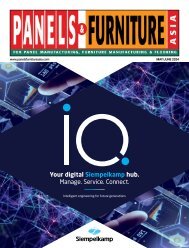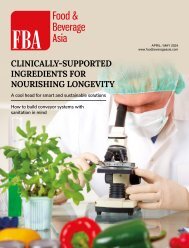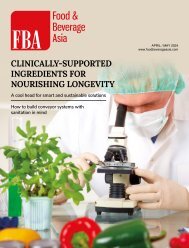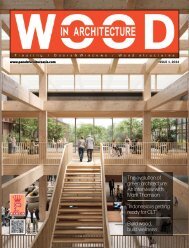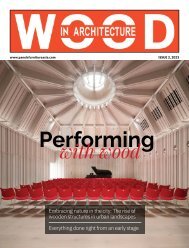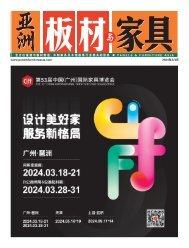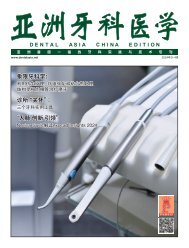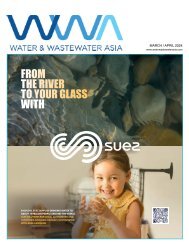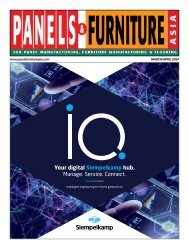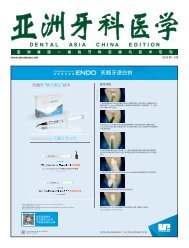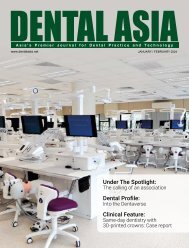Dental Asia March/April 2024
For more than two decades, Dental Asia is the premium journal in linking dental innovators and manufacturers to its rightful audience. We devote ourselves in showcasing the latest dental technology and share evidence-based clinical philosophies to serve as an educational platform to dental professionals. Our combined portfolio of print and digital media also allows us to reach a wider market and secure our position as the leading dental media in the Asia Pacific region while facilitating global interactions among our readers.
For more than two decades, Dental Asia is the premium journal in linking dental innovators
and manufacturers to its rightful audience. We devote ourselves in showcasing the latest dental technology and share evidence-based clinical philosophies to serve as an educational platform to dental professionals. Our combined portfolio of print and digital media also allows us to reach a wider market and secure our position as the leading dental media in the Asia Pacific region while facilitating global interactions among our readers.
Create successful ePaper yourself
Turn your PDF publications into a flip-book with our unique Google optimized e-Paper software.
SHOW PREVIEW<br />
mistaken for an easy procedure. Through<br />
this workshop, I wanted to share some of<br />
my experiences to shed some light on this<br />
complex and regionally relevant topic for<br />
others.<br />
How did you come to gain the expertise and<br />
competence needed to treat complex fully<br />
edentulous patients?<br />
During my university days, dental<br />
implantology was not nearly as common<br />
in Singapore as it is today. Then, most<br />
edentulous patients here relied on dentures,<br />
which have their drawbacks and are thus<br />
slowly being phased out in recent years.<br />
The epicentre for dental implantology<br />
advancements was in North America and<br />
Europe, so I seized an opportunity to pursue<br />
my postgraduate studies at the University of<br />
Washington.<br />
My studies abroad introduced and<br />
accustomed me to many other methods that<br />
were at that time relatively novel, or not yet<br />
implemented here in Singapore. I believe<br />
a great deal of the expertise I have today<br />
can be attributed to my further education<br />
abroad, and I am immensely grateful for that<br />
experience.<br />
Above dental expertise and clinical skillset,<br />
one also needs communication, compassion<br />
and empathy to treat patients, something<br />
often overlooked but no less important. This<br />
is achieved through interacting with patients<br />
and understanding their needs.<br />
Dr Gabriel Lee will<br />
be at the <strong>Dental</strong><br />
Hygienist & Therapist<br />
forum presenting his<br />
lecture on ‘Oral Care<br />
for the Dependent<br />
Older Adult: How Can<br />
I Help?’<br />
Your teaching and research areas focus on<br />
geriatric oral health and oral health services<br />
in nursing homes. Why did you choose to<br />
focus onto these areas?<br />
The choice to dive into geriatric oral health<br />
stems from a combination of understanding<br />
societal needs and a personal desire to help<br />
address healthcare disparities. My interest is<br />
rooted in the belief that oral health is integral to<br />
overall well-being, particularly in older adults.<br />
The demographic shift towards an ageing<br />
population, particularly in Singapore,<br />
underscores the growing importance of<br />
catering to the unique oral health needs of<br />
older adults. With one in four individuals<br />
projected to be aged 65 and above by the<br />
end of the decade, there is a pressing need<br />
for specialised attention to the oral health<br />
challenges that come with ageing.<br />
A personal focus on oral health services in<br />
nursing homes also aligns with the broader<br />
context of healthcare accessibility. Nursing<br />
home residents often face distinct oral health<br />
issues, and there is a recognised gap in<br />
delivering comprehensive dental care within<br />
the long-term care setting. Through research<br />
and contributing to clinical services this<br />
area, I aim to contribute to filling this gap and<br />
improving the overall quality of oral health<br />
services for a vulnerable segment of the<br />
population.<br />
What is the role of international collaboration<br />
and knowledge exchange in delivering better<br />
health outcomes for older adult populations<br />
globally?<br />
The exploration of oral health needs, access<br />
challenges, and the role of dental professionals<br />
in enhancing oral health for Singapore's<br />
older adult population prompts a broader<br />
consideration of the global scenario. In<br />
addressing the shared challenges faced by<br />
numerous societies, regional and international<br />
collaboration and knowledge exchange play<br />
pivotal roles in fostering improved health<br />
outcomes for older adult populations globally.<br />
Partnerships that extend beyond borders<br />
facilitates the exchange of best practices and<br />
innovative approaches within geriatric oral<br />
health care. By learning from the experiences<br />
and successes of different countries, dental<br />
professionals can gain valuable insights<br />
into effective strategies and care models<br />
for addressing common challenges such as<br />
access to care, preventive measures, and<br />
tailored treatment approaches.<br />
Knowledge exchange also promotes the<br />
development of interdisciplinary approaches<br />
to geriatric oral health. Establishing<br />
collaborations between dental professionals,<br />
healthcare providers, researchers, and<br />
policymakers from various countries<br />
can potentially lead to a comprehensive<br />
understanding of the multifaceted nature of<br />
oral health in older adults.<br />
What is the significance of the new<br />
Dr Andrew Fish<br />
will be presenting<br />
in the scientific<br />
conference on<br />
‘Bone Regeneration,<br />
A Scientific and<br />
Clinical Review<br />
of New Synthetic<br />
Material and Surgical<br />
Protocols’<br />
synthetic materials and surgical protocols<br />
for bone regeneration reviewed in your<br />
session?<br />
Modern synthetics are revolutionising<br />
the dental bone grafting world. With<br />
these products eliminating the need for a<br />
separate collagen membrane, they make<br />
my surgery quicker, easier and more<br />
predictable. The fact you can load your<br />
implant at three months with enough<br />
vital bone to have great stability is a<br />
game-changer.<br />
From experience, we also see it completely<br />
replaced by host bone at around 12 months,<br />
so there are no foreign body particles<br />
left in the body, which you often see from<br />
xenografts and other synthetics. These<br />
materials have transformed the way I do<br />
surgery, giving me greater predictability and<br />
ultimately better care for my patients.<br />
As new materials and protocols continue<br />
to develop, what trends are you keeping<br />
an eye on to achieve optimal long-term<br />
outcomes for bone regeneration?<br />
I have always strived to look for what is<br />
best for my patients. I really believe that<br />
minimally invasive surgery helps patients<br />
heal. The way I see dentistry moving is<br />
more towards giving the body what it needs<br />
to heal, to get it as close to the patient’s<br />
original state as possible, instead of relying<br />
on foreign materials that can linger in the<br />
site long-term. DA<br />
58 DENTAL ASIA MARCH / APRIL <strong>2024</strong>


